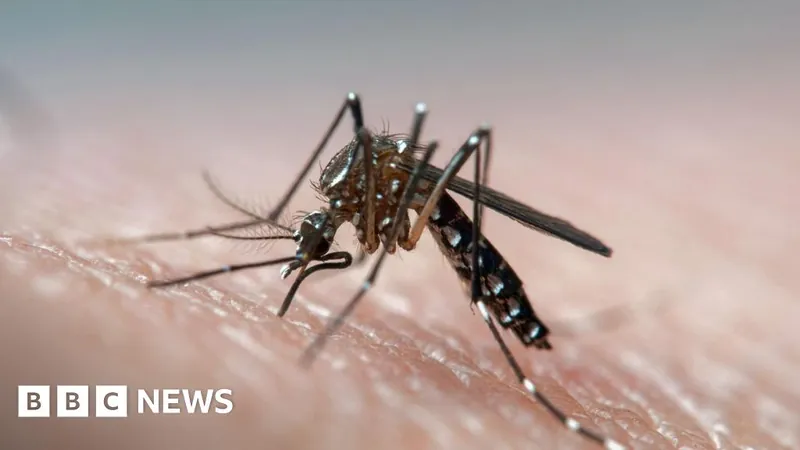
Game-Changer in Dengue Battle: Male Mosquitoes Turn Deaf to Curb Breeding!
2024-11-04
Author: Ying
Introduction
In a groundbreaking and unconventional approach to combating mosquito-transmitted diseases such as dengue, yellow fever, and Zika, scientists have discovered a method that involves making male mosquitoes deaf. This innovative strategy aims to disrupt their mating behaviors, ultimately leading to a decrease in disease-spreading female mosquitoes.
Research Focus
The research team at the University of California, Irvine focused on the Aedes aegypti mosquito, known for transmitting viruses that affect around 400 million people worldwide each year. Male mosquitoes are highly reliant on their sense of hearing to locate females, who attract them with the sound of their wingbeats. In this study, scientists altered a specific genetic pathway that governs this auditory capability.
Genetic Modification Details
By targeting a protein called trpVa, crucial for sound detection, they engineered male mosquitoes that showed no response to the mating calls of females. Remarkably, these genetically modified males did not engage in any mating activity even after being kept in close proximity to females for three days. Conversely, wild males copulated numerous times, successfully fertilizing almost all the females in their environment.
Research Findings
The researchers, whose findings were published in the prestigious journal PNAS, noted that the gene modification appeared to have an "absolute" effect, completely eliminating the mating behavior of the deafened males. According to Dr. Joerg Albert from the University of Oldenburg in Germany, an expert in mosquito mating behaviors, this approach could revolutionize mosquito control efforts. He emphasized the need for careful study and management, stating, "This research provides the first direct molecular evidence indicating that hearing is not just important but essential for mosquito reproduction."
Broader Implications
It's not only the deafening tactic that scientists are exploring; they are also investigating the release of sterile males into areas known for mosquito-borne diseases as another potential control strategy. However, while significant, these efforts must be balanced with the ecological role that mosquitoes play. They serve as key food sources for a variety of animals, including fish, birds, bats, and frogs, and some species even contribute to pollination.
Conclusion
As the fight against mosquito-borne diseases continues, these researchers are paving the way for innovative solutions that could save countless lives. Stay tuned for updates on this essential breakthrough in the ongoing battle against dengue and other mosquito-spread illnesses!




 Brasil (PT)
Brasil (PT)
 Canada (EN)
Canada (EN)
 Chile (ES)
Chile (ES)
 España (ES)
España (ES)
 France (FR)
France (FR)
 Hong Kong (EN)
Hong Kong (EN)
 Italia (IT)
Italia (IT)
 日本 (JA)
日本 (JA)
 Magyarország (HU)
Magyarország (HU)
 Norge (NO)
Norge (NO)
 Polska (PL)
Polska (PL)
 Schweiz (DE)
Schweiz (DE)
 Singapore (EN)
Singapore (EN)
 Sverige (SV)
Sverige (SV)
 Suomi (FI)
Suomi (FI)
 Türkiye (TR)
Türkiye (TR)